33 High Protein Snacks for Kids to Support Development

- High protein is great but doesn’t equate to extra protein for kids.
- There are some special instances where a child may need more protein.
- Benefits of high-protein snacks include more energy, focus, and immunity.
- There are plenty of vegan and nut-free high-protein snack options too.
- There are a few ways to work around a picky eater needing protein.
Nothing’s worse than leaving the house ready for the day ahead only to hear your little one’s voice from the backseat say, “I’m hungry.” All the while, their protein-filled breakfast is laid to waste in the pile of dirty dishes back home. It happens to me more than I’d like to admit, and I’d like to think I’m not the only one!
Snacks are often a saving grace in our house, but they can’t just be any snacks. They have to be high in protein! Let’s face it, cheese puffs don’t quite stick to ribs, and among everything else in the diaper bag, I don’t have room for double the snacks.
If you’re searching for some practical ideas for working in that much-needed protein during snack time, you’ve found them! Get your grocery list handy and learn why high-protein snacks for kids are the way to go.
Should Kids Have High Protein Snacks?
Let’s be honest. When meals roll around and it’s time to eat, kids aren’t always the most cooperative. It can be tough to get your child to eat anything, much less the proteins on their plate. Sometimes healthy snacks are the only time you can get those high protein amounts into their diets. That said, if you can manage it, high-protein snacks are the way to go!
Even so, it’s important to remember that high protein doesn’t mean extra protein. Consistent, large amounts of extra protein has the potential to cause kidney stones and issues with the liver too. Taking in too much protein can also lead to weight gain if your child isn’t active enough.
Don’t let those facts scare you away though. Your little one can still eat protein packed snacks and stay within the proper daily amount for a child. In fact, they need to! Protein is a necessity for their active, energy filled bodies.
According to Joshua Hudson of The Department of Pediatrics at The Arkansas Children’s Nutrition Center in the article titled, Dietary Protein Requirements in Children: Methods for Consideration published in 2021, physical activity increases protein requirements.
They expend so much energy learning and growing. It’s no surprise they need their daily protein to replenish such a large output of activity.
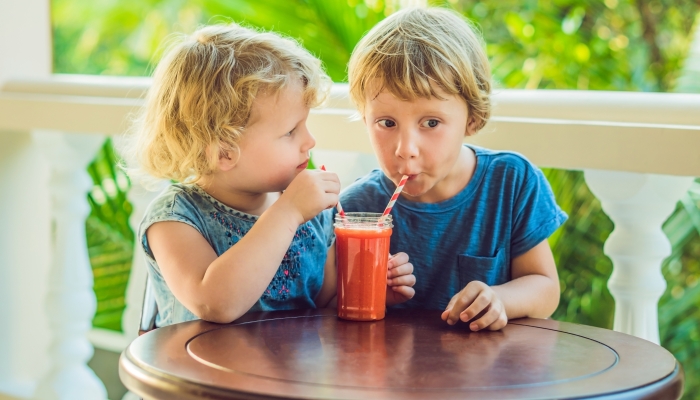
How Much Protein Do Kids Need Each Day?
That being said, how much protein do kids actually need in a day? An important question to ask if you’re monitoring their intake for overconsumption. Toddlers ages 1 to 3 years old need about 13 grams per day. Kids ages 4 to 8 years old need about 19 grams per day and those ages 9 to 13 require 34 grams per day.
In most cases, your child will stick to the figures above. There are some special scenarios where more protein might be warranted though. For instance, if your child has a diagnosed metabolic condition or if they’re underweight, they may need more than the normal amount. Even so, always consult your doctor before making these changes.
Benefits of High Protein Snacks for Kids
Protein itself is the building block to the cell repair process but it doesn’t stop there. There’s no shortage of benefits when it comes to high protein snacks for kids. They include but aren’t limited to:
- Solid energy source. I know what you’re thinking. How could my child possibly need more energy! Their energy is a direct result of proper nutrition though and protein is a huge part of keeping them at the top of their game.
- Staying fuller longer. Keeping little ones full can be a tough task when they put out as much energy as they take in. Luckily, protein rich snacks stand to keep them fuller longer making for less pit stops in your busy day.
- Healthy growth and development. It’s imperative your child gets enough protein in order to build the muscles they need for everyday activity. That same protein is used to further grow organs and repair the body as a whole.
- Strengthened immunity. A lack of protein has been linked to a weaker immune system and we all know how easily kids can get sick! That said, their protein intake is a simple way to protect against possible illness.
- Improved focus. An empty stomach can make it hard for anyone to concentrate, muchless a child. With protein rich foods keeping them fuller longer, they’ll be much more focused and likely more well-behaved.
11 Best High Protein Snacks for Kids
Try some of these high protein snacks for kids:
- Apple and peanut butter: Apple slices paired with nut butter to drizzle or dip!
- Deviled eggs: Use the mixture to blend in some veggies.
- Quesadillas: Create using their favorite cheese and meat.
- Trail mix: Dried fruit, nuts, seeds, popcorn, the sky’s the limit!
- Ants on a log: Celery sticks filled with peanut butter, topped with raisins.
- Deli roll-ups: Their favorite meat and cheese all rolled together.
- Guacamole and veggies: Fresh or pre-made with a variety of veggies.
- Tuna and crackers: Canned tuna on seeded or whole wheat crackers.
For the best high protein, pre-packaged snacks on the go try:
- Planters Portable Protein Snacks
- Yasso Greek Yogurt Bars
- Power Crunch Snack Bar

11 Vegan Protein Snacks for Kids
You can eat plant-based and still get your protein! Try some of these kid-friendly options:
- Hummus: Homemade or store bought with pita or veggies.
- Edamame: Air fried, roasted, or boiled with plenty of seasoning.
- Soy yogurt: A vegan alternative made in a variety of fruit flavors.
- Chickpeas: Roasted chickpeas with endless seasoning choices.
- Kale chips: Baked to a nice crunch, they’ll think they’re normal chips!
- Overnight oats: Oats with plant-based yogurt or milk, seeds, nut butters, and more.
- Black bean salsa: Beans, corn, onion, tomato, bell peppers, spices, and chips.
- Peanut butter and banana sandwich: Whole wheat bread, nut butter, and banana slices.
For vegan, pre-packaged snacks on the go try:
- Justin’s Protein Bars
- Larry & Lenny’s Cookies
- Hippeas White Cheddar Puffs
11 Nut-Free Protein Snacks for Kids
If your child has nut allergies, try some of these nut-free snack options:
- Smoothies: Any fruit, milk, yogurt, or seeds they like.
- Avocado toast: Whole wheat toast with seasoned, mashed avocado.
- Greek yogurt and berries: Yogurt flavor of choice with blueberries and raspberries.
- Muffins: Homemade muffins with seeds, fruits, and spices.
- Pumpkin seeds: Roasted pumpkin seeds in oil and sweet or salty seasonings.
- Chicken salad: Your recipe served with toast, pita, or crackers.
- BLT rice cakes: Rice cakes topped with bacon, lettuce, and tomato.
- Cereal and milk: Low-sugar cereal with whole milk.
For nut-free, pre-packaged snacks on the go try:
- String cheese or cheese sticks
- Made Good Granola Minis
- Enjoy Life Protein Bites
Whether you whip up their snack using a baby food maker or you purchase pre-made, all of the above make for the perfect protein snack sure to keep your little one satiated.
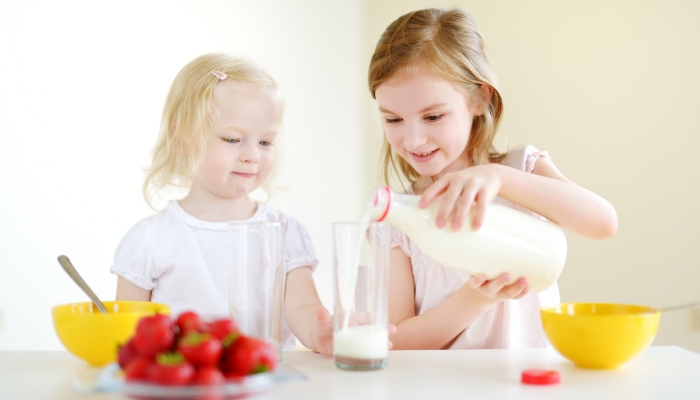
FAQ
What can I do if I have a picky eater who needs more protein?
If you’ve got a picky eater, it may be time to get creative in finding ways to sneak in that much-needed protein. If they like lunch meat wraps, try buying the protein tortillas. Maybe they like toast and you can spread some peanut butter or hummus on it. I’ll often make my kids smoothies and toss several “hidden” protein sources in there as well.
While there are protein supplements that are made for kids, they should be used sparingly and only at the direction of your child’s doctor. These usually come in the form of a shake, protein powder, or a pill they can take daily.
Are there signs of too much daily protein intake in kids?
We know that too much of a good thing isn’t always best, and the same can be said for protein. Lucky for us, the body does a great job of showing us what we need and giving us signs when something is off. While many of these signs could be attributed to other underlying issues, they offer insight to parents who may be worried about protein intake.
Some of the signs of overconsumption include but are not limited to: diarrhea, indigestion, exhaustion, constipation, weight gain, insatiable thirst, headaches, and more. It can be tough to nail down the cause of these symptoms as they’re common among other issues, so always talk to your child’s pediatrician if you have concerns.
Is plant or animal protein best for my child?
A great question with a loaded answer, it’s safe to say that both plant and animal proteins are an important part of your child’s diet. One isn’t necessarily “best,” but each of these sources come with their own set of clear advantages. For example, animal proteins are known to be far easier for the digestive system to absorb.
The quality of animal proteins is usually higher as well, which aids in muscle strength. Plant proteins are just as helpful as they’re said to stave off heart disease while offering plenty of antioxidants and nutrition to sustain the body. While many are divided as to which is “best,” it seems a mixture of the two strikes the perfect balance.
When should I offer my child a protein rich snack?
Your child will likely have 2 or 3 healthy snacks a day. You can offer a snack a few hours before and after each meal. Of course, this isn’t an exact science. You may find your child prefers a snack as close as an hour before their next meal. That’s likely because little bellies need filling more often as they can only hold so much at once.
That leads to another common question regarding bedtime snacks. Again, offering a bedtime snack will hinge on your child’s specific needs. If they’re eating regularly throughout the day but still complaining of hunger prior to bedtime, they could be going through a growth spurt or expending more energy.
A high protein snack at bedtime will help them get the sleep they need with a full belly.
Is cow’s milk really a good source of protein for kids?
Kids will usually start drinking whole cow’s milk at age one barring any dietary restrictions or allergy. It’s easy to see why when cow’s milk is packed with vitamin D, calcium, potassium and other vital nutrients. It’s definitely a great source of high quality protein.
Even though cow’s milk has some stellar benefits, it’s no big deal if your child can’t drink it. My daughter had a severe allergy to cow’s milk and we were able to supplement with other milk forms like soy and almond. They’re not quite as nutrient dense but an option nonetheless.
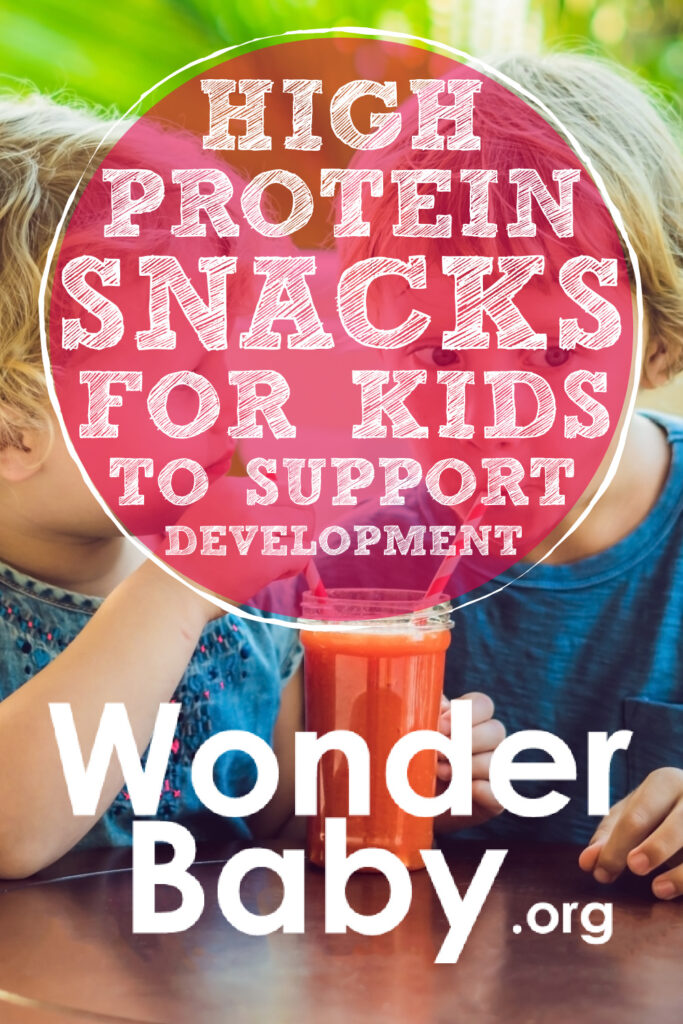
Related Posts
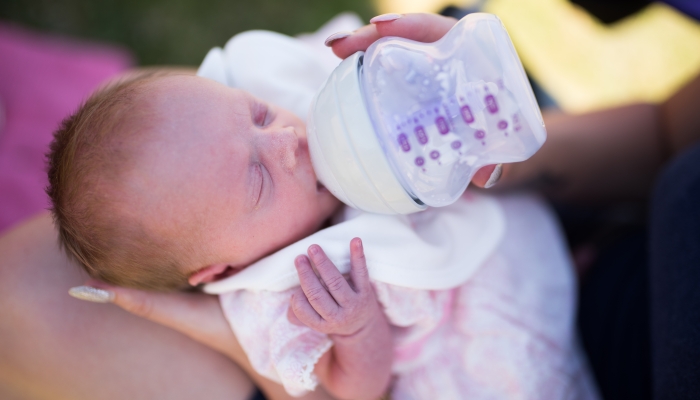
Feeding and Eating, Special Needs
Feeding Therapy Approaches for Infants with Special Needs
Many children with special needs have feeding difficulties. Working with a speech therapist, being patient, and experimenting with textures can help.
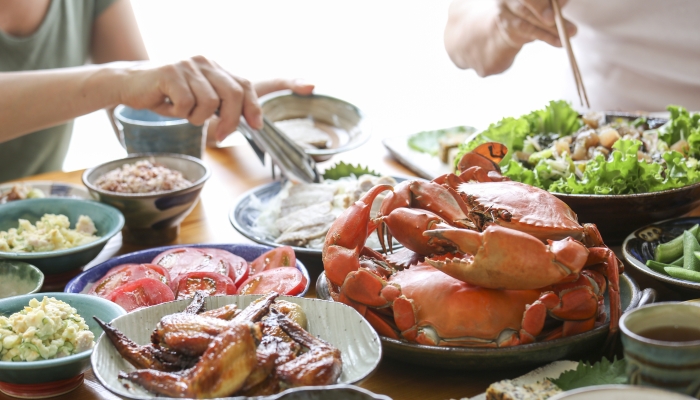
Feeding and Eating
Unexpected Foods That Cause Allergen Cross-Reactivity
A variety of unexpected foods and environmental substances can trigger an allergic reaction through cross-reactivity to food proteins.

Feeding and Eating
Easing Anxiety for Families Facing Food Allergies
Ongoing physical preparations and speaking openly about anxiety can ease the transition from diagnosis to living well with a food allergy.